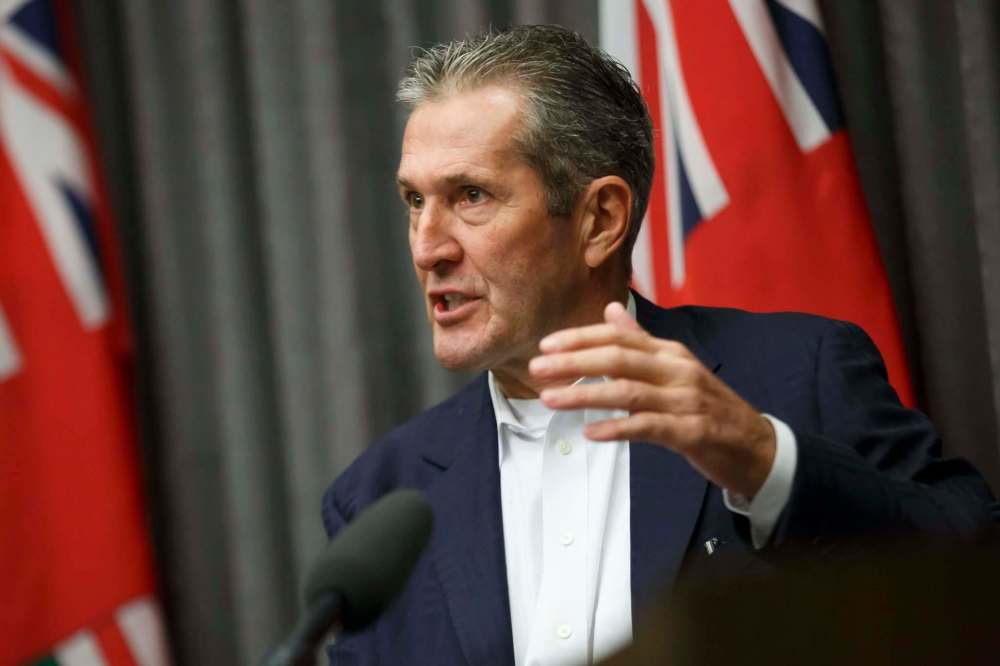Manitoba takes carbon tax fight to Federal Court
Advertisement
Read this article for free:
or
Already have an account? Log in here »
To continue reading, please subscribe:
Monthly Digital Subscription
$1 per week for 24 weeks*
- Enjoy unlimited reading on winnipegfreepress.com
- Read the E-Edition, our digital replica newspaper
- Access News Break, our award-winning app
- Play interactive puzzles
*Billed as $4 plus GST every four weeks. Offer only available to new and qualified returning subscribers. Cancel any time.
Read unlimited articles for free today:
or
Already have an account? Log in here »
Hey there, time traveller!
This article was published 28/02/2020 (1831 days ago), so information in it may no longer be current.
Manitobans will be paying more than $1 billion in extra taxes over the next five years, if Ottawa continues to administer its carbon levy in the province, Premier Brian Pallister says.
The premier made the comment Friday, as Manitoba submitted a 57-page legal argument in Federal Court in a bid to strike down the tax, which the province argues has been applied unevenly across the country.
A hearing date has not been set.

“I want to make Manitobans aware of what we’re doing because the consequences for Manitobans are very real,” Pallister told reporters. “The stakes are high.”
Manitobans will pay $1 billion more in carbon taxes than they would have under the province’s initial carbon tax proposal of $25 per tonne, Pallister said. The federal backstop tax — imposed on provinces without their own carbon tax plan — is currently set at $20/tonne, but will increase to $30 this year and to $50/tonne by 2022.
Manitoba has received intervenor status in a challenge by Ontario and Saskatchewan to be heard by the Supreme Court of Canada next month.
At the same time, it has initiated a separate challenge to the tax in Federal Court, arguing the backstop tax infringes upon provincial jurisdiction and is being applied arbitrarily across the country.
It’s doing all this as it continues to negotiate with Ottawa in a bid to gain control of the tax, which, it continues to argue, should remain flat.
Pallister said he is hopeful, with a minority government pledging to build bridges across Canada, the federal Liberals will work with Manitoba on a negotiated settlement.
“Should they not, we’d be forced to continue our legal challenge,” he said.
According to Manitoba’s court submission, Ottawa has arbitrarily and unfairly allowed exemptions to the carbon tax to several provinces (with their own pricing regimes) unavailable to Manitoba.
For example, an exemption allowed to Alberta’s oil and gas industry is not available in Manitoba. Manitobans pay the tax on home heating, but the federal government has negotiated exemptions for Prince Edward Island and Newfoundland.
“Indigenous people living in remote fly-in communities in northern Manitoba and other provinces may… feel aggrieved that intra-provincial aviation fuel is exempt from a carbon levy in some parts of Canada under the federal scheme, but not here,” Manitoba said in its court submission.
“While Manitobans must bear the full brunt of the carbon price on gasoline and diesel, the federal government has permitted PEI, NL (Newfoundland) and Nova Scotia to raise their net gasoline taxes by only one cent/litre or less, sending a far weaker price signal than contemplated by the (federal) benchmark,” it said.
The province said Ottawa has acted “arbitrarily, unreasonably and exceeded its delegated authority” by applying the federal benchmark in an uneven manner.
Manitoba originally planned a $25/tonne carbon tax in 2017, but withdrew the proposal when it failed to receive federal assurances it would not eventually have to hike the levy.
Meanwhile, Pallister repeated his complaint Ottawa has failed to credit Manitoba for making massive investments in hydroelectric power.
Pallister said the interest residents will pay to service Manitoba Hydro investments this year alone amounts to more than $800 million. “That equates to a carbon tax of over $720 per person per year,” he said.
larry.kusch@freepress.mb.ca

Larry Kusch
Legislature reporter
Larry Kusch didn’t know what he wanted to do with his life until he attended a high school newspaper editor’s workshop in Regina in the summer of 1969 and listened to a university student speak glowingly about the journalism program at Carleton University in Ottawa.
Our newsroom depends on a growing audience of readers to power our journalism. If you are not a paid reader, please consider becoming a subscriber.
Our newsroom depends on its audience of readers to power our journalism. Thank you for your support.
History
Updated on Friday, February 28, 2020 7:01 PM CST: Updated with carbon tax story.


